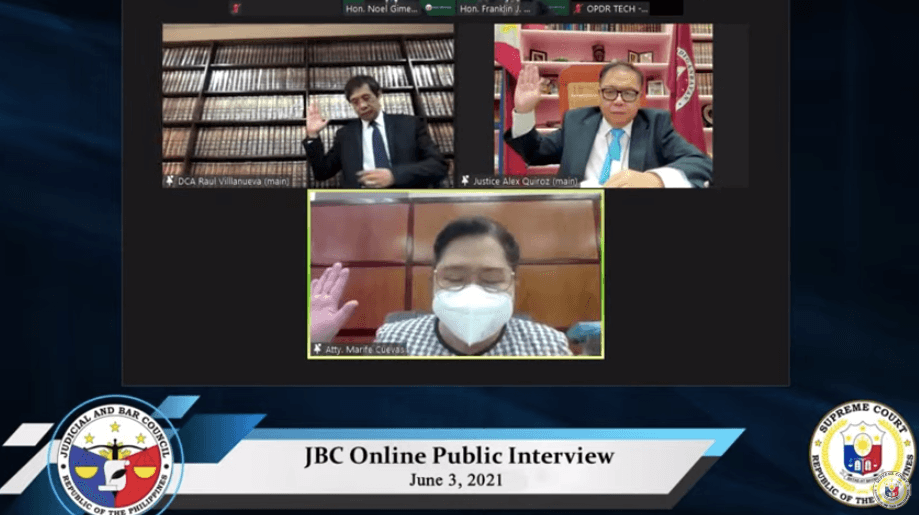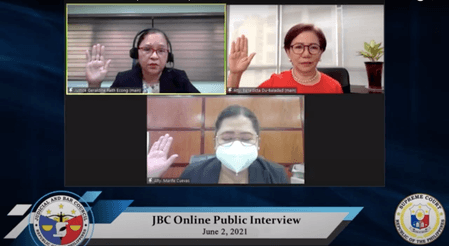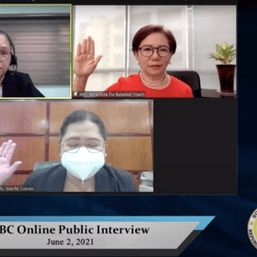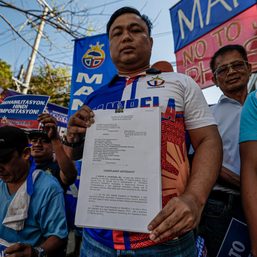SUMMARY
This is AI generated summarization, which may have errors. For context, always refer to the full article.

From same-sex marriage to the anti-terror law, and even the controversial hero’s burial of the late dictator Ferdinand Marcos, when should Supreme Court restrain and let the executive and legislative branches do their jobs, and when should justices go ahead and make law?
That was a recurring topic in two days of Judicial and Bar Council (JBC) interviews for a Supreme Court justice post, which wrapped up on Thursday, June 3.
JBC member and retired SC justice Noel Tijam started with the feared anti-terror law, which Solicitor General Jose Calida said was a political issue that is not covered by the Court’s power of judicial review.
“It was signed by the President, who is also a lawyer and there are a lot of legal scholars in Malacañang, is it valid to assume that the law is constiutional because it was deliberated upon?”
Sandiganbayan Justice Geraldine Faith Econg, applying for the Supreme Court, said: “That’s the presumption, your honor.”
While there is a general presumption of constitutionality for all laws passed, anti-terror law petitioners invoke the Supreme Court’s power of judicial review.
“Can the Supreme Court supply the deficiency in the anti-terror law or soothe the apprehensions and the anxiety of the petitioners by issuing special rules, similar to a writ of amparo, in the exercise of their rule-making power?” asked Tijam.
“No, your honor,” said Econg. “Because that is judicial legislation,” the anti-graft court justice said, referring to the principle of judicial legislation frowned upon for usurpation of the Congress’ powers.
As Chief Justice Alexander Gesmundo defined it during his own JBC interview, “judicial legislation is when the Court interprets a law [in a way that] is not in the law and interjects its own belief of what should be there in the law.”
But is the anti-terror law a political question, and would the Supreme Court need to legislate?
First, the political question doctrine is constantly blamed for validating Ferdinand Marcos’ Martial Law, and by extension, all the abuses that came with the dictatorship.
But the anti-terror law is not a political question, said the petitioner’s counsel John Molo – a constitutional professor at the University of the Philippines (UP) College of Law – during oral arguments.
Molo said an issue is only a political question if there’s no existing judicial standard that would guide the Court, which would result in the Court legislating.
“We have judicial standards, your honor. They are the Bill of Rights, and the entire body of jurisprudence enacting the Bill of Rights, they are judicial and they have already been discovered over decades,” Molo said, pointing out that the anti-terror law violates 15 out of the 22 items of the Bill of Rights.
Same-sex marriage
In the same-sex marriage case, the Supreme Court denied it on lack of a legal standing by the petitioner as the latter was not applying for a marriage license.
But a whole reading of the ruling shows it was denied because the justices believed it’s a matter “better left to Congress.”
Econg said she “sincerely wants to recognize same-sex marriage” by striking down the provision in the Family Code that defines marriage as being between a man and a woman only. The Constitution, Econg said, does not have such prohibition.
But who will do it? Econg wasn’t directly asked but the justice said “Congress should change the definition in the Family Code.”
“This is a Congress that had many opportunities to amend the Family Code since the early 1990s but has failed to do so,” said UP constitutional law professor Dan Gatmaytan in a paper published in 2020.
Saying that the Supreme Court was simply “unwilling” to take on the case, Gatmaytan said the decision “in my view is not the proper exercise of judicial review but an abdication of its function as a Court.”
At the JBC, Tijam asked about gender equality and whether it’s constitutional for the Philippines to adopt legislation that would allow transgenders to go to their public facilities of choice or punish parents who do not allow their children to undergo gender reassignment procedures.
Sandiganbayan Justice Rafael Lagos, also an applicant, said “that’s a very hard question [because] we’re not really that advanced.”
“But the constitutional right to pursue happiness should be considered here. If you’re a binary person and you don’t want to be identified as male or female, you have that right,” said Lagos.
But pushed some more, Lagos said that society’s readiness has to be balanced.
“I would still think we’re not really mature enough to accept those kinds of law, and if I were a sitting justice, I would say it’s not constitutional,” said Lagos.
Marcos’ hero’s burial
A recent case of a so-called political question is the controversial hero’s burial given to the late dictator Ferdinand Marcos.
Deputy Court Administrator Raul Villanueva, a Supreme Court applicant, said that the case is an example of a right decision but an unpopular one.
“I agree with the decision to allow the burial of the former president in the Libingan ng mga Bayani,” said Villanueva.
Villanueva said it was a decision that respected the separation of powers, as it was Duterte’s government who sanctioned the burial.
JBC member and retired SC justice Jose Mendoza, who concurred in the decision, said it was to uphold judicial restraint.
In his concurring opinion, Mendoza wrote that “the Court should not take sides in this political controversy.”
On Thursday, Mendoza explained further that it was because the “Supreme Court cannot intrude into the affairs of the coequal branches.”
Another case is the challenge to President Rodrigo Duterte’s unilateral withdrawal from the International Criminal Court, which was another question to the power of presidential discretion.
Last March, the Supreme Court junked the petitions saying the issue had become moot.
Villanueva said he disagreed only with the aspect of mootness, saying the Supreme Court could have still issued a guidance.
Quo warranto
But if we’re talking about separation of powers, the power to impeach an official has been constitutionally granted to Congress.
That was a main issue in the quo warranto ouster of former chief justice Maria Lourdes Sereno. Does the Supreme Court resorting to a quo warranto mode violate the constitutional clause that justices can only be removed via impeachment by Congress?
Agreeing that the quo warranto mode was correct, Econg said quo warranto pertains to qualifications and not matters of impeachment such as the betrayal of public trust.
Sandiganbayan Justice Alex Quiroz, also an applicant, said he would also retain the quo warranto mode.
Villanueva just said the Court has spoken and the only right time to revisit would be when a similar petition is filed.
Court of Appeals Justice Ronaldo Roberto Martin, another applicant, said “quo warranto goes against the Constitution.”
“At the time, it was not [a wrong remedy], but given the magnitude of its aftermath, I came to agree that only impeachment should be the only way out for an incumbent justice,” said Martin. – Rappler.com
Add a comment
How does this make you feel?

![[ANALYSIS] More fuel to the fire: The Supreme Court](https://www.rappler.com/tachyon/2023/07/tl-more-fuel-to-the-fire.jpg?resize=257%2C257&crop=273px%2C0px%2C720px%2C720px)
![[OPINION] New lawyers, our watch begins](https://www.rappler.com/tachyon/2023/05/ispeak-ourwatchbegins.jpg?resize=257%2C257&crop=245px%2C0px%2C720px%2C720px)







There are no comments yet. Add your comment to start the conversation.